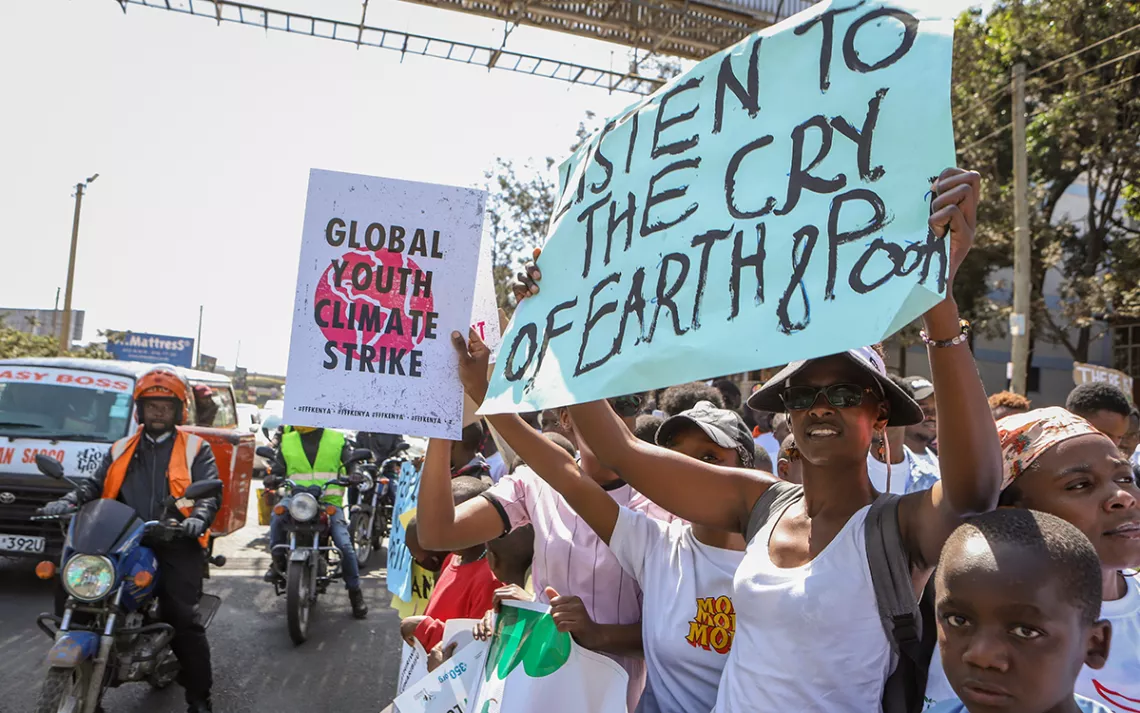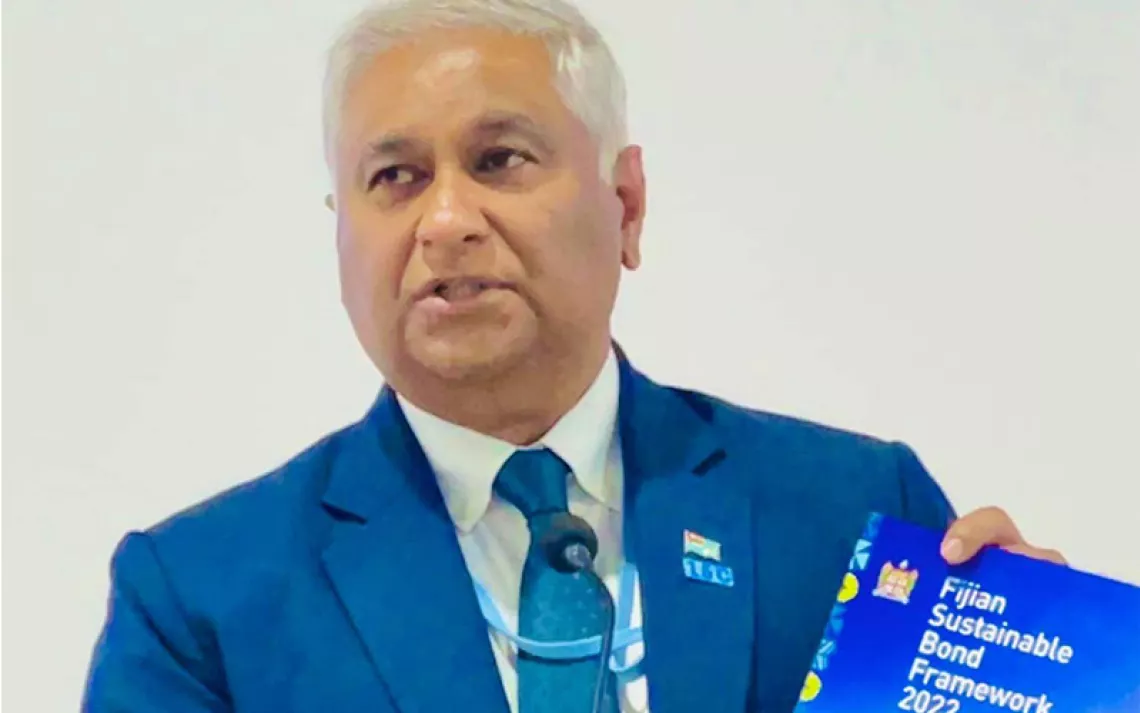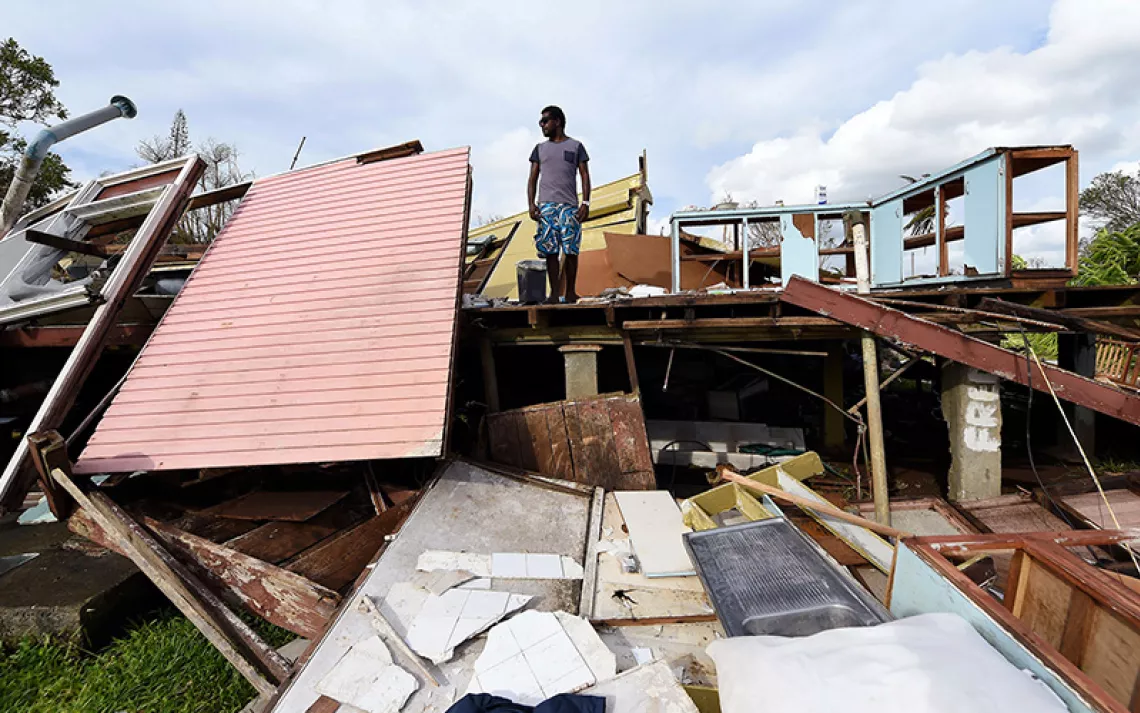The Global Climate Breakdown: What Does the Inflation Reduction Act Mean for International Climate Policy?
A conversation with the Union of Concerned Scientists’ Rachel Cleetus

Kenyan activists protest to highlight the effects of global warming and demand more aid for poor countries, in downtown Nairobi on September 24. | Photo by AP Photo
The Inflation Reduction Act, which Congress passed and President Biden signed into law in August, is widely seen as the most important climate action the federal government has ever taken. It provides a broad suite of tax incentives and investments to expand research and hasten the deployment of a wide range of climate-friendly technologies. It will create millions of new jobs in the clean energy industries. And it is estimated that it will take a huge chunk out of America’s carbon pollution—helping to reduce it by 40 percent below 2005 levels by 2030.
While most of the discussion of this historic legislation has focused on its effects here in the United States, the new law may also have enormous implications for the global effort to contain climate change. It could change the dynamics of global climate diplomacy and catalyze greater climate action by other countries. At the same time, there is a lot it doesn’t do. Mainly, it doesn’t provide any support to countries that desperately need assistance in reducing their emissions and dealing with the environmental and social impacts of climate change.
To explore the international effects of the Inflation Reduction Act (IRA), I reached out to Rachel Cleetus, policy director and lead economist of the Climate and Energy program for the Union of Concerned Scientists. Rachel is an economist by training and a fierce advocate for equity in global climate efforts. She’s also one of the most perceptive analysts of the international climate challenge around. Our conversation has been edited for clarity and brevity.
Steve Herz: Let's start with diplomacy. The Biden administration aspires to be a leader on climate issues, but there's this history of the United State not doing its part: not committing to cut emissions sufficiently, not even staying in agreements that the US helped negotiate and the rest of the world has agreed to. Given this history, how do you think the rest of the world perceives the passage of the IRA, and how do you think it will affect the Biden administration's climate diplomacy?
Rachel Cleetus: We saw some relief, that there is durability in this commitment because Congress has passed legislation. The history of the US has been that as administrations have changed, we flip-flopped a lot. We've made commitments around climate finance and then not delivered. We have watered down international agreements and blocked action. So, the US has not lived up to its responsibilities on a global stage. And I think the world is cautiously optimistic that this time around, we will follow through. But because of our history, I think claiming the mantle of leadership is going a step too far. At this point, the world is just looking for the US to be consistent and show up and live up to its responsibilities. I think it'll be important for the US to approach the global stage with humility.
SH: The rest of the world saw the process that the administration and the Democratic leadership went through to get the IRA over the finish line. They expended so much political capital, domestically, trying to meet the US commitments to the Paris Agreement. Do you think the perception that the administration is spending real political capital domestically on climate change will have an impact on how other countries approach their own commitments and the efforts they put in to meet them?
RC: I want to start by reflecting on the irony that it takes political capital to do the obvious and necessary. We've got people around the nation who are reeling from these devastating climate impacts. Climate change is here now. And simultaneously, the opportunity for clean energy is tremendous, in addressing climate change but also creating jobs and cutting conventional pollution. So I think it's a reflection of the dysfunction in our political system, that the president even has to expend political capital on doing the obvious.
But I do think it's been really critical that from the beginning, this administration has centered science and equity in their approach to addressing big issues, whether it was COVID or climate, and that aspect, I think, has not been lost on the rest of the world.
Rachel Cleetus, policy director of the Climate and Energy program for the Union of Concerned Scientists. | Photo courtesy Union of Concerned Scientists
SH: Although climate change is obviously a global challenge, so much of the IRA is organized around US self-interest: creating jobs, revitalizing domestic manufacturing, increasing competitiveness, and supporting disadvantaged communities. Do you think that's a framing that other countries are likely to use as they seek to reduce their own emissions?
RC: I think climate policy is at its most effective when it is intersectional. You're not going to solve climate in a corner. It must be connected with people's daily concerns, and they're not at odds with each other. Yes, you can have a clean energy economy that creates jobs and cuts pollution. Yes, you can invest in climate resilience that actually helps protect communities that are most exposed. So when we align these imperatives, we get the most traction. And I think that the analog in the international space is that there are pathways to deal with climate change that align with sustainable development goals. Wherever you live, you want clean air, and clean water, you want a job, you want fair labor standards, and all these things can be aligned.
It's our opposition—I’m just going to call out the fossil fuel industry—that continues this drumbeat of misinformation, that says addressing climate change is somehow detrimental to the economy. In fact, inaction is the worst thing we can do from an economic perspective. So I think this will be true everywhere in the world: You can address climate change and benefit people. It's a both/and.
SH: You're right to call out the fossil fuel industry here, and the IRA actually includes some indications of its power. The law includes provisions to advance fossil fuel leasing and development. And then there’s also this pending side deal that could relax permitting requirements on new fossil fuel projects. Do you think that the giveaways to the fossil fuel industry will undermine the credibility gains that were achieved by the rest of the bill? And will it compromise the administration’s ability to be more effective in its climate diplomacy?
RC: What it exposes, first and foremost, is that the power of the fossil fuel industry is still a big impediment to transformative climate action. And it does call out the hypocrisy here where, on one hand, there's a lot of pressure on low-income countries to get off coal, to get off gas, but the rich countries are still continuing to invest in them. So I do think that is hypocrisy that will be called out on the global stage. And just to be clear, it is a dead end to continue investing in fossil fuel infrastructure, and it has a tremendously racist and pernicious impact on communities that live in the shadow of this kind of infrastructure.
What the US needs to do to contribute to the global climate effort mainly comes down to two things. One is reducing our emissions domestically. And the other, as you alluded to, is providing money to poor countries to help them reduce their emissions and to deal with the crushing impacts of climate change. And for all its contribution to reducing emissions in the US, the IRA doesn't include any money for climate finance.
SH: So what would you say is needed on that front? And what does the lack of climate finance mean for US diplomacy and credibility?
RC: From the very beginning, the global climate agreements have recognized that richer countries are primarily responsible for the climate impacts we're seeing today, and that there is a need for richer countries to take responsibility for that. Because they industrialized first, they have greater capacity to help with this transition. This bill was domestically focused and did not address those issues.
At this point, richer countries like the US have really failed to deliver on climate finance, and Congress has not appropriated enough funding. In fact, we had a very disappointing outcome in the last round of the federal US budget. So it's really important for the administration to push for climate finance that's necessary for low-income, climate-vulnerable countries to make a clean energy transition and cope with climate impacts.
SH: Just to put this in context, the last congressional appropriation for international climate finance was $1 billion. That’s indicative of the gap between what Congress has appropriated and what Biden would like to do.
RC: I think there needs to be a greater understanding of what's happening with a climate-altered world and other parts of the globe. And the reality is, there's a whole litany of climate impacts around the world and they're intersecting with economic growth and the energy crisis so that many, many more millions of people are being pushed back into poverty. It is significantly affecting development in other parts of the world. It's affecting health outcomes, food access, and economic well-being. And this will continue to worsen. Climate change is going to intersect with other challenges and create these kinds of compound crises. So that's why this climate finance investment is an investment in well-being around the world.
SH: The US has fallen well short on what it should be providing for climate finance. Other donors have as well, and collectively, the donor countries have not been meeting their goal of mobilizing $100 billion each year. But it does seem that providing climate finance is particularly difficult for the United States. Proportionally, other countries are giving much more. And it seems like it's part of a pattern. During the pandemic, Congress appropriated about $5 trillion in economic stimulus. And yet virtually nothing in the stimulus went to help poor countries work through their own economic crises that were brought on by the pandemic. Do you have a view on why the US political leaders don't seem to have the capacity to act with a sense of fairness, empathy, and solidarity with poor countries around shared challenges?
RC: Two big things come to mind. One is that on a human level, on an individual level, people in America are extraordinarily generous. There's a lot of connection with community and support through community groups, religious groups, a range of mutual aid, and ways in which people show up. I think, unfortunately, our economic system right now has delivered such a high degree of inequality and a sense of precariousness for most people. It's not surprising that if you put a lot of people in a sense of fear and precariousness, they do turn inward and they have to think about their day-to-day because that's the reality. So that is one piece. But there's a whole other piece with the elite in our country who are doing very, very well, who I think are very entrenched in keeping the status quo going and are not actually interested in the world moving into a clean energy economy that might disrupt their profits. And so they have no interest in the US showing up on the global stage.
I think those two things really stick out for me: how much of our policymaking process has become captured by industry interests and the genuine challenges that people face in this inequitable economy.
SH: There's the counter-example of the support that the United States has been willing to provide to Ukraine. The US has given $13.5 billion to Ukraine since the Biden administration took office, and that's mobilizing a lot of money very quickly for a country that is in desperate straits. Why do you think we were more willing to do that for Ukraine than for countries that are hard hit by climate change? Are there ways that we can be more effective at mobilizing money for climate change, based on the experience of doing so for Ukraine?
RC: For one thing, let's just acknowledge that the media and visibility play a big role in terms of what rises to the top. And then the reality is that people who “look like us” register with us in a way that vast chunks of the world's population just don't. There are many, many people who have been forcibly displaced in Ukraine and have become refugees. They've been welcomed with open arms in the rest of Europe, and that has not been the case for displaced folks and migrants from Africa, Asia, etc. Climate change is going to displace a lot of people around the world—it already is. Let's make sure that we have a human-rights-centered approach that actually gives value—just the way refugees from Ukraine are being treated—to how refugees and displaced people need to be treated at large.
And then the other piece is the military aspect, the huge military-industrial complex that is always at the ready to take advantage of situations like this and push even more military spending. All of those things have been at play.
SH: We've talked generally about climate finance. I wanted to make sure we spent a little time talking specifically about “loss and damage.” First, can you just describe the problem? And what do you think is needed from the US?
RC: There are climate impacts that are so extreme that they're beyond the ability of ordinary adaptation measures. And we're talking about things like sea level rise, or desertification from drought and more. These are already a reality, but they're going to get much worse. And as a result, people in climate-vulnerable countries, in the Global South in particular, are at the greatest risk. Think about small island nations or a country like Bangladesh. Think about the Horn of Africa right now.
And these sorts of extreme climate impacts are in a class by themselves, and richer nations really need to live up to their climate obligations, because otherwise, lots of people are going to be displaced, lots of people are going to lose their lives or livelihoods. What we're looking for is two things. One is, yes, finance. And the call last year in Glasgow at COP26 was a very strong one from countries in the Global South as well as the NGO community for richer nations to provide loss and damage finance. That didn't move forward. At the upcoming UN-sponsored climate negotiations at Sharm-El-Sheikh in Egypt, there's absolutely an expectation that richer nations will move forward a pathway to funding for loss and damage.
The other piece is the human-rights-centered framework, because it's not just money. In some cases, the losses are extreme, people will be displaced, and how are they going to be received in other places? How are they going to be safe? This process is also one that richer nations need to engage with very actively.
The US has historically been a big obstacle on loss and damage. They have refused to engage on this issue in any substantive way, and that has to stop. The US must engage in a constructive way, must move forward a valuable pathway for the facility for loss and damage funding and engage on the human rights considerations as well. And just to be clear, this is not to be wrapped into adaptation, and this is not about humanitarian aid. This is really significant scale-up for loss and damage specifically.
SH: How do you think the shortfalls in finance for loss and damage are going to affect the outcomes at COP27 in Sharm-El-Sheikh?
RC: I think the US succeeding in securing this legislation, the IRA, is a very significant boost that will increase ambition from other countries as well. We will not see the breakthroughs we need to see if it's not complemented by climate finance. This is why our big push here in the United States is for Congress to appropriate international funding. And I think other richer countries as well need to step up and make sure that climate finance is forthcoming.
The final piece at this COP is the impact of the science of the IPCC reports. The three reports that have come out of the last year are very, very clear that the window to act is really narrowing. And I think that the science—I mean, every day if you read the headlines—you get the sense we're coming very close to tipping points.
I think that the COP being in Africa will bring home the urgency of what is happening on that continent. I think this COP cannot be successful unless there are breakthroughs on climate finance and loss and damage as well. It's critical. The United States going into it with just the Inflation Reduction Act is not enough.
About this series:
The Climate Breakdown is hosted by Steve Herz, the Sierra Club’s international climate policy advisor. At least once a month, Herz talks with experts and changemakers to help you understand some of the most important global climate issues.
 The Magazine of The Sierra Club
The Magazine of The Sierra Club



